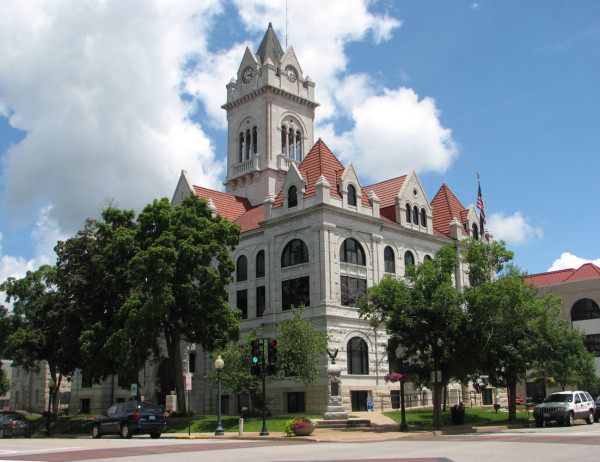Attorney general says his office will begin to take action against non-compliant public health agencies, school districts in January
A Cole County judge declined some counties’ efforts to intervene in a recent ruling that stymied local health departments’ ability to impose sweeping COVID-19 orders.
Judge Daniel Green denied all motions to intervene on Wednesday. He had previously ruled Department of Health and Senior Services (DHSS) regulations allowing the state director and directors of local health agencies to use “personal discretion” to implement mandates or restrictions were unconstitutional.
The regulations allowed health directors to close schools or places of public assembly in the interest of protecting public health during the pandemic. The judge declared those orders, reliant on the DHSS regulations, void.
St. Louis and Jackson counties, along with a few local public health agencies, opposed the November ruling and sought to intervene.
“This case is about whether Missouri’s Department of Health and Senior Services regulations can abolish representative government in the creation of public health laws, and whether it can authorize closure of a school or assembly based on the unfettered opinion of an unelected official,” Green’s November order said. “This Court finds it cannot.”
“DHSS regulations break our three-branch system of government in ways that a middle school civics student would recognize because they place the creation of orders or laws, and enforcement of those laws, into the hands of an unelected administrative official.”
Cooper County Health Center, one of the entities that sought to intervene, said a letter from Attorney General Eric Schmitt instructing local public health departments to end pandemic-related mandates had “created confusion and significant uncertainty” regarding the scope and applicability of the November judgment.
Attorney Stephen Jeffrey, who represents the Cooper County Public Health Center administrator and the Livingston County Health Center board of trustees, said his clients’ motions to intervene “sought to protect their respective legal rights by seeking clarity concerning the confusion and uncertainty regarding the legal status of their respective county health orders and regulations.”
His clients are evaluating whether to appeal the denial, Jeffrey told The Missouri Times in an email. If an appeal is forthcoming, it will be filed within the next 10 days, he said.
The lawsuit against DHSS was brought by Shannon Robinson, Satchmo’s Bar and Grill, and Church of the Word who argued the regulations allowed local health agencies “to exercise unbridled and unfettered personal authority to in effect, legislate.”
In their own response to the motions to intervene, the plaintiffs argued the counties waited “until the eleventh hour” to intervene despite the case being pending for nearly one year.
“The putative intervenors’ post-judgment criticisms of this Court’s judgment are just sour grapes, which give them no right to intervene,” the response said.
Since the November order, Schmitt — who has vociferously opposed mask, vaccine, and other mandates during the pandemic at the state and federal level — also sent more than four dozen cease and desist letters to school districts telling them to end their mandates.
Schmitt had asked parents for their help in identifying schools that still imposed mandates relying on local public health department orders.
“We have informed local public health authorities and school districts multiple times about the ruling, including 52 cease and desist letters to non-compliant school districts, ordering them to cease enforcement of mask mandates and quarantine orders,” Schmitt said in a statement Wednesday. “Since those letters were sent out, a number of school districts have ceased or plan to cease mask mandates and quarantine orders. Now that the ruling is final, non-compliant school districts and local public health authorities should rescind public health orders covered under the ruling or face litigation from the Attorney General’s Office. We plan to begin enforcement action on non-compliant entities as soon as January.”
The crescendo of Missouri Republicans concerned about the impact of local public health orders culminated in a new state law this year that set time restrictions on how long certain orders can remain in place without approval by a local governing body.
When he signed the legislation into law, Gov. Mike Parson said it would require more transparency in local public health orders.
As Green noted in his November judgment, other states have seen similar health mandates thrown out in court.
Earlier this month, a Pennsylvania court said the acting health secretary did not have the authority to implement a statewide mask mandate.
And last year, Wisconsin’s state Supreme Court struck down a stay-at-home order because it said the governor’s administration did not have the authority to implement it.
More than 14,600 new cases of COVID-19 have been identified in Missouri over the past week along with 30 confirmed deaths. The new omicron variant has caused concern in the U.S., particularly among those who have not been vaccinated. Nearly 57 percent of Missouri’s eligible population are fully vaccinated against COVID-19.

Kaitlyn Schallhorn was the editor in chief of The Missouri Times from 2020-2022. She joined the newspaper in early 2019 after working as a reporter for Fox News in New York City.
Throughout her career, Kaitlyn has covered political campaigns across the U.S., including the 2016 presidential election, and humanitarian aid efforts in Africa and the Middle East.
She is a native of Missouri who studied journalism at Winthrop University in South Carolina. She is also an alumna of the National Journalism Center in Washington, D.C.
Contact Kaitlyn at kaitlyn@themissouritimes.com.































